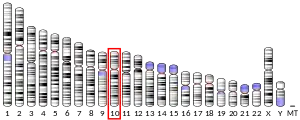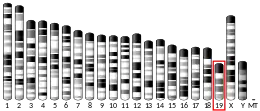HOGA1
4-Hydroxy-2-oxoglutarate aldolase, mitochondrial (HOGA1) also known as dihydrodipicolinate synthase-like (DHDPSL) is an enzyme that in humans is encoded by the HOGA1 gene. The protein is one of the enzymes (4-hydroxy-2-oxoglutarate aldolase) involved in metabolism of hydroxyproline to glyoxylate. The enzyme overactivity can form excessive glyoxylate from hydroxyproline. Glyoxylate is catabolised to oxalate, resulting in excess excretion of oxalate in urine, predisposing to oxalate stone; a condition known as primary hyperoxaluria type III.[5]
| HOGA1 | |||||||||||||||||||||||||||||||||||||||||||||||||||
|---|---|---|---|---|---|---|---|---|---|---|---|---|---|---|---|---|---|---|---|---|---|---|---|---|---|---|---|---|---|---|---|---|---|---|---|---|---|---|---|---|---|---|---|---|---|---|---|---|---|---|---|
| |||||||||||||||||||||||||||||||||||||||||||||||||||
| Identifiers | |||||||||||||||||||||||||||||||||||||||||||||||||||
| Aliases | HOGA1, C10orf65, DHDPS2, DHDPSL, HP3, NPL2, 4-hydroxy-2-oxoglutarate aldolase 1 | ||||||||||||||||||||||||||||||||||||||||||||||||||
| External IDs | OMIM: 613597 MGI: 1914682 HomoloGene: 12130 GeneCards: HOGA1 | ||||||||||||||||||||||||||||||||||||||||||||||||||
| |||||||||||||||||||||||||||||||||||||||||||||||||||
| |||||||||||||||||||||||||||||||||||||||||||||||||||
| |||||||||||||||||||||||||||||||||||||||||||||||||||
| |||||||||||||||||||||||||||||||||||||||||||||||||||
| |||||||||||||||||||||||||||||||||||||||||||||||||||
| Wikidata | |||||||||||||||||||||||||||||||||||||||||||||||||||
| |||||||||||||||||||||||||||||||||||||||||||||||||||
References
- GRCh38: Ensembl release 89: ENSG00000241935 - Ensembl, May 2017
- GRCm38: Ensembl release 89: ENSMUSG00000025176 - Ensembl, May 2017
- "Human PubMed Reference:". National Center for Biotechnology Information, U.S. National Library of Medicine.
- "Mouse PubMed Reference:". National Center for Biotechnology Information, U.S. National Library of Medicine.
- Belostotsky R, Seboun E, Idelson GH, Milliner DS, Becker-Cohen R, Rinat C, Monico CG, Feinstein S, Ben-Shalom E, Magen D, Weissman I, Charon C, Frishberg Y (September 2010). "Mutations in DHDPSL are responsible for primary hyperoxaluria type III". American Journal of Human Genetics. 87 (3): 392–9. doi:10.1016/j.ajhg.2010.07.023. PMC 2933339. PMID 20797690.
This article is issued from Wikipedia. The text is licensed under Creative Commons - Attribution - Sharealike. Additional terms may apply for the media files.



